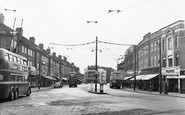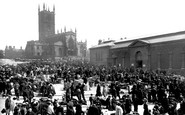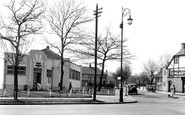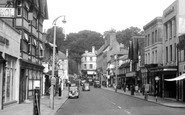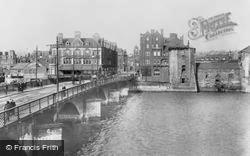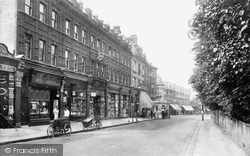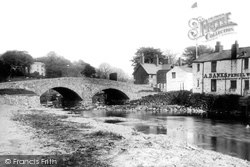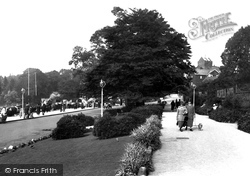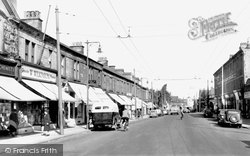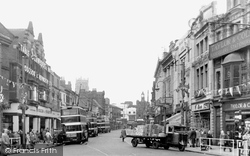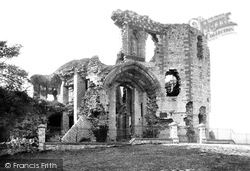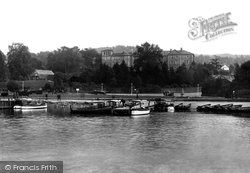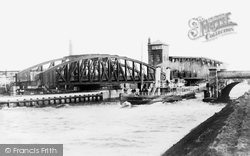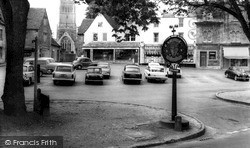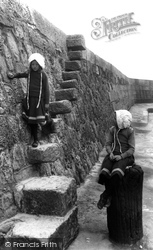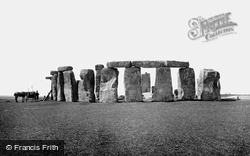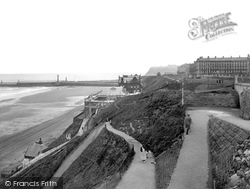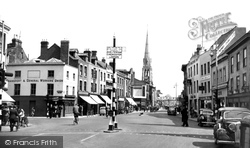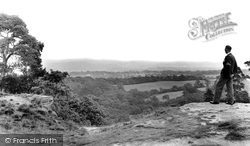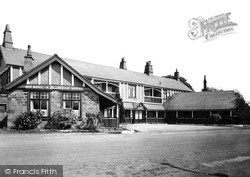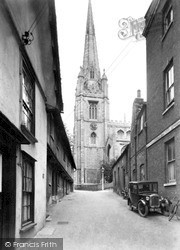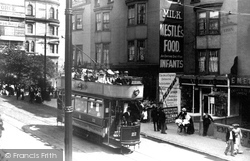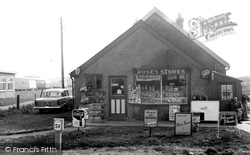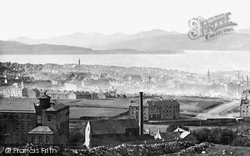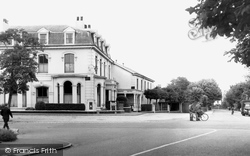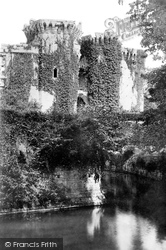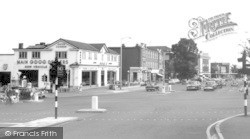Places
2 places found.
Those places high-lighted have photos. All locations may have maps, books and memories.
Photos
3 photos found. Showing results 601 to 3.
Maps
29 maps found.
Books
1 books found. Showing results 721 to 1.
Memories
1,365 memories found. Showing results 301 to 310.
1934 To 1961
I was born in Grove Avenue in 1934. Was not evacuated in the war .attended St Marys Church as a choir boy, went to St Marys. Infant school , then on to Orleans. Sec Leaving in 1949., after winning the Twickenham Schools Cricket ...Read more
A memory of Twickenham by
Little Smeaton School
My Mum Jessie Bull previously Johnson now aged 95 was I at the school certainly 85 years ago as she won a race for running and received a small cup of which she is still very proud of to this day. ...Read more
A memory of Little Smeaton by
1973 Demolition Year For The Market Buildings
I arrived in Wolverhampton when demolition of the market buildings was under way. The buildings in front of the church (in the photo) must have already been long gone, but the buildings on the side ...Read more
A memory of Wolverhampton
The School Of The Holy Child, Laleham Abbey
heads the label in a dictionary of music that I received as a prize in Upper IA. No date. It must have been 1955. My name was/is Margaret Morley. I joined the school on my return from Malaya in 1951, followed ...Read more
A memory of Laleham
Growing Up In Leeds Street
My sister and I were also born in North Mid Hospital and grew up in Leeds St in the late 1950/early 1960s. We remember well the fruit and veg stalls at the end of the road in particular we remember them being run by a chap ...Read more
A memory of Edmonton
War Time In Shirley
I was born in Croydon in 1936, and lived In West Way, Shirley. My mother could not bear to part with us, so we lived at home all through the war. A bomb was dropped into the garden next door. After six months it was discovered it ...Read more
A memory of Shirley by
This Photo Is A Bit Older Than Estimated
I lived in Stubbington from 1957 (when I was born - home birth in residence behind newsagents on the green) until I was married in 1978. For most of my childhood until 10 yrs old we lived in the Post Office ...Read more
A memory of Stubbington by
Haven Green Trainspotting In The Fifties
I remember seeing CITY OF TRURO come through one evening. It had been taken out of Swindon museum and restored. I also remember seeing the BROWN BOVERI GAS TURBINE on several occassions. It had been ordered by ...Read more
A memory of Ealing by
Happy Days Outweighed The Bad
Hi Heather & Briony & Kate I was also a boarder at St Oswalds Girls School,Rowena Steveson was the head mistress(Rhino).I remember the dreaded morning run having to eat a spoonful of molasses every ...Read more
A memory of Allerwash by
Happy First Holiday In Polperro 1958
My very first holiday away from mum and dad as a 17 year old on my way to Polperro from Morden in Surrey. My father saw me off on the train in London with instructions to change at Liskeard then catch the next ...Read more
A memory of Reigate by
Captions
918 captions found. Showing results 721 to 744.
From here we can just see the dome of the Corn Exchange (centre). On the left is the Shaftesbury Café, which became Jay's Furnishing Stores in 1915.
Here we see the beginnings of a familiar retail pattern: multinationals are taking over the high street. On the left is Home & Colonial, which by this date had several hundred branches.
Here we see the bridge over the River Greta in the busy little market town of Keswick in the northern Lakes.
We can see the back of the boat station, with 'cushion huts' peeping out behind the strolling crowds, whilst to the right 'Schneider's gate' is flanked by the bold 'Belsfield Hotel' sign.
In 1947 over 57,000 punters flocked to Newcastle Races on Plate Day to see the first running of the race since 1939.
We can see the 15th-century tower of St George's church on the horizon (left). This was rebuilt to the designs of Sir Gilbert Scott in 1858 after a major fire five years earlier.
Here we see the remains of the great triple-towered gatehouse. It is thought that Edward I's engineer-architect Master James of St George was responsible for its design.
Behind the horse and trap (left) we can just see the little gate used by Schneider en route to and from his steam yacht.
When the Ship Canal first opened (our view is only twelve months after that opening on 1 January 1894), many people wanted to travel, and see the wonders of this new waterway.
We can see the magnificent east window of the chancel and the unusual east window of the nave, both almost filling the wall with glass.
The poet Alfred Tennyson walked across the hills from Bridport in order to see the spot in August 1867.
As we look southwards from the Hele stone, through the middle arch, we can see the tallest stone of the inner horseshoes of trilithons.
Here we see the beginnings of a familiar retail pattern: multinationals are taking over the high street. On the left is Home & Colonial, which by this date had several hundred branches.
Here we see the well-loved old glass-roofed Floral Pavilion with the Spa Theatre behind.
Here we see the deviation that leads to London, Cheltenham and Cirencester. The TGWU building stands at the junction with Worcester Street.
This is another viewpoint on the Edge, from which it is usually possible to see the Cage in Lyme Park.
The tombstone of a cavalry rider and a replica of a parade helmet are what visitors come from far away to see. The original helmet, found by the river Ribble in 1796, is in the British Museum.
Here we see the church path leading up to it, with 16th-century cottages on the left and Dorset House on the right.
As we look toward West Pier from the west, we see the landward pavilion at the right, then the tower of the Metropole to its left. Nearer the camera are a range of somewhat disparate stucco fronts.
Spilsby Rural District Council is stating its presence – see the concrete sign (left foreground). The store is also advertising its wares.
In this view, we see the smoking chimneypots of Greenock and the entrance to Gare Loch.
Here we see the Grapes Hotel. The young men by the bike outside seem to be in uniform, so they probably came from the airbase.
Here we see the gatehouse and the moat of the tower-keep. As a professional soldier, William Herbert had fought for and been knighted by Henry VI.
There is a tendency to see the development of the London suburbs only in terms of public transport, but the motorcar proved increasingly important from this period.
Places (2)
Photos (3)
Memories (1365)
Books (1)
Maps (29)

